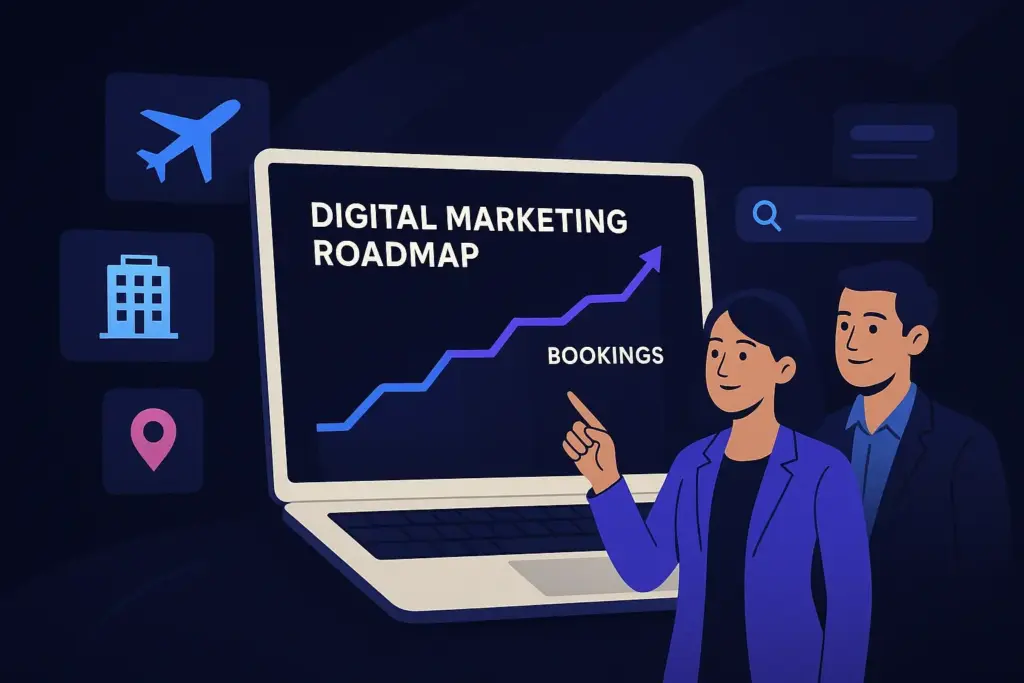Did you know that over 70% of travel planning begins with a search engine query?
This figure highlights a robust online presence is not just beneficial for travel websites, but essential.
Helping travel businesses navigate the highly competitive digital landscape is what I specialise in. After all, optimising a travel website for search engines can mean the difference between an undiscovered gem and a thriving destination hotspot!
With so many travellers turning to Google before they pack their bags, my focus is on creating a travel website SEO strategy that includes the latest best practices. Whether a travel business is taking its first steps online or is an established brand that serves thousands of customers, understanding the ins and outs of travel SEO is vital in this sector.
Key Takeaways
- The importance of SEO for travel businesses cannot be overstated, with the majority of travel planning starting online
- A targeted travel website SEO strategy is essential for improving visibility and driving potential customers to your site
- Travel SEO strategies must evolve in response to changing search engine algorithms and user behaviours
- SEO for travel bloggers is just as critical, requiring them to keep pace with SEO best practices for maximum outreach
- Optimising a travel website for search engines involves a combination of technical, on-page, and off-page SEO tactics
- Thoroughly understanding and applying travel SEO principles will give travel websites a competitive edge in a saturated market
Starting with the Basics: Understanding SEO for Travel Websites
Mastering search engine optimisation for travel sites is key to the success of travel-related businesses and as someone passionate about ensuring that breathtaking destinations are just a click away for searchers, I recognise the transformative power SEO can exert on a travel website’s visibility and user experience.
With that in mind, I’ll explain what makes SEO an essential component in the travel industry engine.
Defining SEO and its Importance in the Travel Industry
SEO, or search engine optimisation, is the art and science of tweaking your online content so that a search engine likes to show it as a top result for searches related to your sector.
For the travel industry, it’s the difference between being invisible, or attracting a substantial number of customers.
By employing tailored strategies such as honing meta descriptions and optimising content around popularly searched terms, your travel site can improve rankings, contributing towards business growth.
Core Components of SEO for Travel Agencies
Grabbing that top travel website ranking on Google demands a focus on various SEO components. A travel agency’s best bet is to champion strategies that cater to the nuanced needs of both local and national prospective customers.
Below are the key elements that steer the direction of an effective SEO journey:
- Mobile Readiness: With most users browsing on mobile devices, a travel site must display seamlessly on smartphones and tablets
- Content Quality: High-quality, engaging, and informative content ensures visitors stick around and search engines take notice
- Keyword Integration: Using the right keywords is like using the correct map coordinates – it ensures those searching for travel insights find your site efficiently
- Local SEO: For attracting tourists to local attractions, a refined focus on local SEO can guide those nearby to your doorstep
- Technical Website Attributes: Behind-the-scenes elements like site speed and structured data are foundational for good SEO
- Online Reputation Management: Boosting reviews and social proof can elevate your agency’s credibility and search engine ranking alike
By integrating these components into your SEO strategy, you’ll not only elevate your travel website’s profile but also curate an online experience that speaks of adventure and discovery as fluently as your customers dream about it.
Implementing Keyword Strategies for Travel Website SEO
As an experienced travel SEO specialist, I know that mastering the art of keyword strategy is essential to connecting with my client’s audiences. In the sphere of travel website SEO, employing comprehensive keyword research and the integration of long-tail keywords into my blog posts and social media campaigns are key to a successful online presence.
Conducting Comprehensive Keyword Research
My approach to keyword research begins with understanding the intent and behaviour of travellers searching online.
Utilising tools like Semrush Keyword Magic, I look into the data to uncover the search terms that my potential audience might use when planning their next travel experience. This exploration is not just about popularity; it’s about relevance and precision in aligning with what potential customers are truly seeking.
Integrating Long-Tail Keywords to Target Specific Traveller Personas
Incorporating long-tail keywords into my content goes beyond general searches, targeting niche groups with specific interests.
This could be anything from “budget family holidays in Cornwall” to “luxury eco-retreats in the Scottish Highlands,” ensuring content resonates with the unique desires of varying traveller personalities.
This practice not only improves SEO efficacy but also enhances the relatability and value of the content to the readers.
| Keyword Type | Search Volume | User Intent | Content Suitability |
|---|---|---|---|
| Budget family holidays in Cornwall | 1,500/mo | Seeking affordable family vacations | Destination Guides, Budget Travel Tips |
| Luxury eco-retreats in the Scottish Highlands | 200/mo | Looking for sustainable luxury accommodations | Resort Reviews, Eco-Tourism |
| Best city breaks for solo travellers | 800/mo | Individuals planning solo city adventures | City Guides, Solo Travel Advice |
Taking time on keyword research and selecting relevant long-tail keywords not only enhances SEO effectiveness but also ensures that each blog post or landing page effectively addresses the queries and needs of my readers.
This highly targeted strategy contributes to an increase in the visibility of travel websites, increasing traffic and brand awareness, creating an increase in trust among those searching for their next holiday.
Optimising User Experience for Enhanced Website Performance
Recognising the foundations of successful online performance is an unparalleled user experience (UX). It’s the thoughtful touches of clarity in navigation, compelling meta descriptions, and the seamless combination of well-written sales copy with on-page SEO. Reviewing agency CRO tips for the travel industry will also help.
Factoring in meeting the needs of users whilst increasing their engagement ultimately leads to more conversion and an increase in revenue.
For travel websites, the interplay between solid SEO practices and a good UX is non-negotiable and I aim to ensure that each element on the site contributes positively to the user experience.
Well-thought-out meta descriptions invite the click from the SERPs, while thoughtful on-page SEO increases relevancy, improves keyword positions, and provides visitors what they need.
“Great UX and page SEO are the unseen engines of memorable travel websites. They work tirelessly behind the scenes to deliver a user experience that not only satisfies but transcends expectations.”
- Fluid navigation that guides users effortlessly to their desired information
- Engaging meta descriptions that summarise the soul of each destination
- Responsive design that caters to globetrotters on every device
- Content that speaks with authenticity, aiding SEO for the travel website
Integrating these principles, I build an online presence that resonates with users and search engines alike, giving due respect to the technical aspects of SEO and the human touch of user-centric design.
The commitment to UX improves website performance, and it is a commitment I uphold in every aspect of my work. After all, the journey of SEO is much like that of travel itself – it’s the nuanced experiences along the way that make the destination worth reaching.
Mastering On-Page Optimisations
When it comes to securing a top spot in search engine rankings, mastering on-page SEO for travel websites is non-negotiable.
This involves perfecting several elements to ensure each webpage not only has unique content but also meets the requirements of search algorithms. I find this pursuit fascinating, as it merges the art of writing with the science of search engine relevance.
Our starting point is to optimise page titles; these are one of the most important factors of on-page SEO. Each must contain target keywords, yet remain compelling enough to generate clicks.
Equally vital is the structure of our pages which needs proper headings to guide both readers and search engines through the content. Think of a landing page not just as a destination but as the point of the conversion journey: detailed, informative, and inviting to the traveller seeking their next adventure.
Moreover, the importance of meta descriptions should not be overlooked. These brief previews help increase CTR (Click Through Rate) from the search engine results, and give a glimpse as to what is on the full page.
Optimising URLs for clarity and keyword integration further describes the webpage, much as a distinctive landmark sets apart a destination.
Let’s not forget, too, that images with proper alt tags and titles act as snapshots of the experience, encouraging the viewer to delve deeper and increasing the likelihood of appearing within the image search results.
Here’s a snapshot of how on-page elements can be mastered for superior page performance:
| On-Page Element | Benefits | Best Practices |
|---|---|---|
| Unique Content | Reduces bounce rate, engages readers | Ensure originality and relevance of text to each page |
| Keyword-rich Page Titles | Improves SERP rankings, enhances click-through rate | Incorporate primary keywords seamlessly |
| Structured Headings (H1, H2, etc.) | Organises content, aids accessibility | Use headings to outline main points and subtopics |
| Engaging Meta Descriptions | Boosts click-through rates from SERPs | Write compelling summaries with focus keywords |
| Optimised URLs | Enhances user understanding, assists page indexing | Include target keywords and ensure readability |
| Optimised Images | Reduces load time, enriches content | Use descriptive file names and alt-text |
Lastly, the content marketing aspect of on-page SEO is where creativity meets analytics.
The blog on your travel website isn’t simply a collection of articles and tips; it’s a curated exhibition of your expertise.
Each post should be a magnet for traffic, rich in the keywords your audience wants and built in the way search engines need.
With these efforts, my on-page SEO approach shapes each webpage into a valuable resource for those researching into their options.
Leveraging Local SEO for Travel Agents To Enhance Visibility
For travel agents with physical locations, local SEO is an important element in improving their online presence within the specific locales they serve.
By prioritising tasks such as claiming a Google Business profile and incorporating location-specific keywords into the content, I can significantly increase the reach to their potential clients nearby.
Additionally, cultivating a network of local citations amplifies the visibility further in an increasingly competitive space.
Claiming Your Google Business Profile
To initiate, I claim and update my client’s Google Business profile. This essential step ensures that the travel agency appears prominently when potential clients are searching for travel services in their area.
It is critical to keep the business information accurate and current, including operating hours, contact details, and address, as well as to upload high-quality photos that reflect your brand.
Targeting Location-Specific Keywords and Building Local Citations
Next, I focus on targeting keywords that highlight the specific destinations and services my client offers, fine-tuning content to the queries potential customers might use when exploring their travel options.
To further solidify the local SEO efforts, I build local citations, listing the travel agency on key travel directories and partnering with other local businesses and attractions to cross-promote services, increasing my client’s ties to the community and increasing its visibility.
- Verification and updates of travel agency details on Google Business profile
- Strategic utilisation of location-based keywords in both website content and metadata
- Building a robust network of local citations through collaborations and directory listings
Through the application of these travel website SEO strategies and tips, I am confident in creating a more prominent local footprint, ultimately attracting more customers within the target vicinity. Commitment to these practices is a worthwhile investment in the ever-competitive travel sector.
Engaging Potential Customers Through Content Marketing
As someone invested in the success of a travel website, knowing that an effective content strategy is at the heart of engaging potential customers and improving travel SEO.
Creating compelling content, from insightful blog posts to captivating visual elements, attracts an audience looking for travel inspiration and knowledge.
Developing a Content Strategy for Travel Blogs
My approach to developing a content strategy for travel blogs starts with understanding what kind of information my client’s audience is looking for. This involves examining a range of topics from savvy travelling tips to in-depth destination guides.
The aim is to offer content that not only informs but also entices readers to dream of their next holiday.
To this end, employing both SEO-centric blog posts and inviting guest posts from influential travel bloggers enriches the variety and depth of the content, enhancing the overall travel website SEO.
Utilising Visual Content to Attract and Retain Readership
When I think about retaining readership, I focus on the power of visual storytelling.
High-quality images and immersive video content are tools to showcase travel experiences.
I am convinced that visuals evoke emotions and curiosity, prompting readers to share their finds and return repeatedly.
Custom-tailored galleries and videos cement a site’s reputation as a travel authority, making it a go-to destination for both advice and inspiration.
Diving into Technical SEO: Improving Website Infrastructure
Technical SEO cannot be overstated, as it is the foundation upon which a secure and consistent digital presence is established.
The technical elements of SEO – site speed, mobile optimisation, and a secure platform – are essential for enhancing not just the user experience but also for cementing the trustworthiness of a website in the eyes of both visitors and search engine algorithms.
Enhancing Site Speed and Mobile Responsiveness
My focus is first directed towards augmenting website speed, a critical lever that can significantly boost a site’s ranking on search engines.
Load times are a decisive factor for maintaining the attention of travellers who are frequently on the go.
In tandem with speed, mobile optimisation is equally vital as statistics demonstrate an incessant growth in mobile searches.
Ensuring that a travel site is not only accessible but also navigable with ease on smartphones and tablets is a priority that I take very seriously.
- Examine and optimise images and media files for rapid loading without compromising quality
- Minify CSS, JavaScript, and HTML to reduce unnecessary code that slows down the site
- Implement a responsive design that adjusts seamlessly to various screen sizes and orientations
- Choose a reliable web hosting provider that ensures minimal downtime and quick server responses
Implementing Secure and Accessible Web Practices
Equally crucial to website performance is the implementation of secure web practices.
I am a staunch proponent of HTTPS encryption to safeguard user data—a fundamental measure in a world increasingly aware of digital privacy concerns.
Protecting sensitive customer information during transactions with an SSL certificate is not just a good practice; it is an expectation of both search engines and online users nowadays.
- Acquire and install an SSL certificate to ensure the website is on HTTPS rather than HTTP
- Ensure that all forms, especially those involving personal and payment information, are encrypted
- Regularly update systems and software to guard against security vulnerabilities
- Adopt accessibility standards that make the site usable for all individuals, including those with disabilities
By addressing these technical SEO elements, the infrastructure of a travel website can be solidified, and enhance its visibility and functionality.
This approach is an indispensable part of the SEO strategy that I employ to elevate a travel website’s online presence.
Conclusion
Mastering the art of SEO for your travel website is ensuring each element plays a significant role in the overall success.
I have outlined the best practices for travel website SEO that work together to address the nuanced needs of the travel industry and encourage you to check out this SEO case study for a travel business.
Ultimately, a robust travel website SEO strategy is not hinged solely on any single tactic but on a comprehensive approach that includes on-page optimisation, technical considerations, mobile-friendliness, local SEO, and the creation of compelling content.
It’s not just about ticking boxes; it is about creating an immersive and accessible experience for the traveller even before their journey begins.
By employing strategic keyword variances and focusing on optimising user interactions, your site can achieve the dual objectives of solidifying user trust and climbing the search engine ranks.
A secure, technically excellent infrastructure further ensures that travellers’ digital interactions are as seamless and safe as any well-planned itinerary.
It’s clear to me that the travel businesses poised for growth are those that treat their SEO with the same care as they do their customers’ travel experiences.
It’s an ongoing pursuit of excellence that promises not only visibility in a crowded market but also the potential for sustained success and expansion in the competitive realm of modern tourism.




